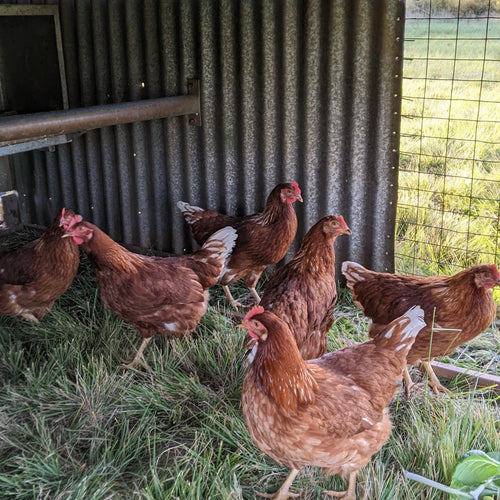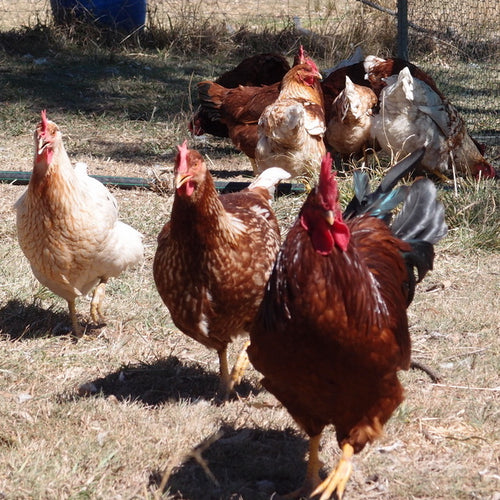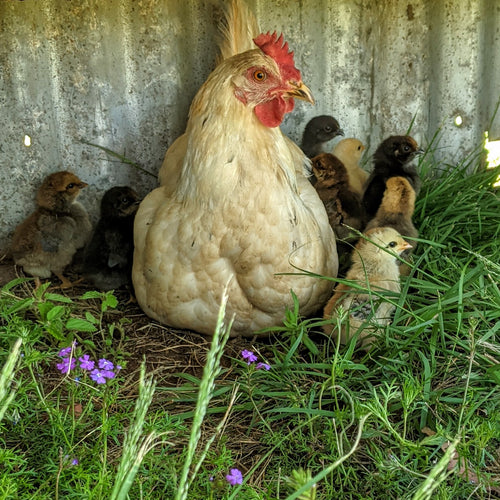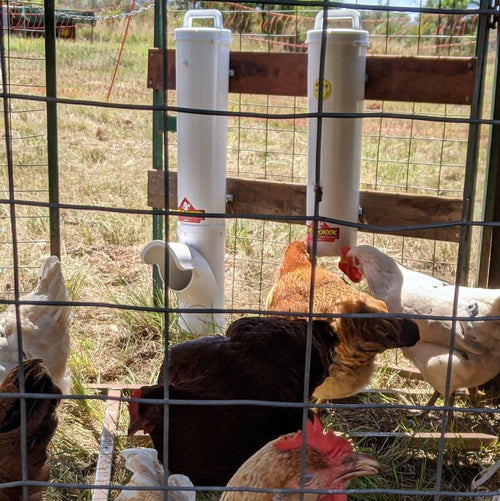Getting started with chickens - Gavin Webber
Farmer Liz: A couple of weeks ago I started a series of interviews with bloggers who keep chickens, as a continuation of my series of interviews about getting started with growing your own. Most of the bloggers from the first series keep chickens too and were keen to join in again. This week I have an interview with Gavin Webber from the The Greening of Gavin.
Gavin grows fruit and veges in Melton, Victoria, just south of the Great Dividing Ranges, on his suburban house block. Gavin also keeps chickens, has two worm farms, and many compost bins. His blog was recently awarded ReNew Magazine 2012 Blog of the Year, where he writes about his sustainable journey and lifestyle that was brought on by a green epiphany. You can read more in Gavin's first interview about growing food.
Attracting well over 1.4 million page views, and containing over 1350 posts, The Greening of Gavin has been published nearly every day for the past 5 years, and is a treasure trove of sustainable living advice and gardening tips. Gavin has also written five sustainable living eBooks including “The Way of the Chicken – A Guide to Keeping Backyard Chickens”. All are available from all good eBook retailers.
So tell us Gavin, how many chickens (and other fowl) do you keep, what breed and what do you use them for (meat, eggs, slug control etc)?
Gavin: I currently have 10 hens and no roosters. I have six ISA Browns, two Leghorns, and two Pekin Bantams. The large hens are for egg production and the bantams are for pest control. They all grow old gracefully, and I do not cull them as they get old as a reward for all of the service they provide me.
FL: Where did you get your first chickens and how do you now replenish your flock?
| Gavin with one of his chooks |
 |
| chicken ebook |
Gavin: I currently have 10 hens and no roosters. I have six ISA Browns, two Leghorns, and two Pekin Bantams. The large hens are for egg production and the bantams are for pest control. They all grow old gracefully, and I do not cull them as they get old as a reward for all of the service they provide me.
FL: Where did you get your first chickens and how do you now replenish your flock?
G: I bought my first hens from a lady named Sue who lives in New Gisborne, which is about 40 minutes north of Melton. She lives on a bush block and breeds hens for sale. They are well looked after, and she sells the pullets at point of lay. As the older hens pass away, I replace them with pullets. We still have one hen from our original flock that is 5 years old. Bunty is at the top of the pecking order, and probably will be until the day she dies.
| some of Gavin's ISA browns |
FL: Fixed chicken run or movable pen? Why?
G: I actually have both, but the mobile pen is only used once a season. The chooks are normally housed in a fixed pen which we dubbed Cluckingham Palace. My son Ben and I built it from scratch by hand. I do believe that the girls love their home.
We also have a pen that fits over a single garden bed, which I use to prepare a bed for the next season. The bantams mainly use this so as to remove all the pests and weeds, and liberally fertilise it for me.
FL: How do you integrate your chickens into the rest of your garden/farm?
G: The bantams free range on weekends around the secondary veggie patch, mainly digging up coddling moth larvae and bugs from around some of my fruit trees. They also weed the stoned areas around my landscaped garden, and get paid in greens and worms. Cheap and willing workers!
G: I actually have both, but the mobile pen is only used once a season. The chooks are normally housed in a fixed pen which we dubbed Cluckingham Palace. My son Ben and I built it from scratch by hand. I do believe that the girls love their home.
We also have a pen that fits over a single garden bed, which I use to prepare a bed for the next season. The bantams mainly use this so as to remove all the pests and weeds, and liberally fertilise it for me.
FL: How do you integrate your chickens into the rest of your garden/farm?
G: The bantams free range on weekends around the secondary veggie patch, mainly digging up coddling moth larvae and bugs from around some of my fruit trees. They also weed the stoned areas around my landscaped garden, and get paid in greens and worms. Cheap and willing workers!
| chickens in the garden |
FL: What is your biggest chicken challenge at the moment?
G: Scaly leg mites! The larger hens need constant attention, so I keep these little nasties away with a liberal dunking of the hens legs in olive oil once a fortnight. If I don’t keep on top of their treatment they keep getting infected.
I don’t mind that the chooks go off the lay once a year for two reasons. 1) It gives the girls a well deserved rest to grow their feathers back and refresh their bodies for the next round of laying, and 2) It gives us an egg famine and gratitude when the eggs come back online!
FL: What is the best thing about keeping chickens?
G: They make me laugh. Chickens are funny, somewhat intelligent, curious, stupid, and social. I enjoy sitting near their run with a glass of wine on a Sunday afternoon and just watch them do chicken stuff. Better than watching TV, that’s for sure!
They make amazing pets which earn their own keep, if you choose to sell the excess eggs.
FL: What is your advice to new chicken owners? What do know now that you wish you knew before you got chickens?
G: Chickens are essential to the suburbanite for eggs, fertilizer and pest control. Without them, your garden will never thrive without costing you a small fortune buying external inputs to replace their services. I wish I had have brought chooks into our life years earlier than we did.
FL: What is your advice to people who would like to keep chickens in the suburbs?
G: If you intend on letting chooks free range, make sure you protect your food garden. Given half the chance, they will destroy everything in sight. Either cage the chooks or your vegetables.
I don’t mind that the chooks go off the lay once a year for two reasons. 1) It gives the girls a well deserved rest to grow their feathers back and refresh their bodies for the next round of laying, and 2) It gives us an egg famine and gratitude when the eggs come back online!
FL: What is the best thing about keeping chickens?
G: They make me laugh. Chickens are funny, somewhat intelligent, curious, stupid, and social. I enjoy sitting near their run with a glass of wine on a Sunday afternoon and just watch them do chicken stuff. Better than watching TV, that’s for sure!
They make amazing pets which earn their own keep, if you choose to sell the excess eggs.
| the bantams :) |
FL: What is your advice to new chicken owners? What do know now that you wish you knew before you got chickens?
G: Chickens are essential to the suburbanite for eggs, fertilizer and pest control. Without them, your garden will never thrive without costing you a small fortune buying external inputs to replace their services. I wish I had have brought chooks into our life years earlier than we did.
FL: What is your advice to people who would like to keep chickens in the suburbs?
G: If you intend on letting chooks free range, make sure you protect your food garden. Given half the chance, they will destroy everything in sight. Either cage the chooks or your vegetables.
FL: Thanks Gavin! Great philosophy on the egg famine, this is true for so much of the food we produce, the seasonality makes us appreciate it even more :) Your chickens are very lucky to be treated with such respect, and to be such an important part of your garden. Head over to Gavin's blog to leave comments and ask questions about keeping chickens in the suburbs. His ebook is also a great resource for those interested in backyard chickens.
By the way, my chicken eBook is now available if you want to know more about backyard chickens and using chicken tractors. More information over at the chicken tractor ebook blog. Or you can get it directly from my shop on Etsy (.pdf format), or Amazon Kindle or just send me an email eight.acres.liz {at} gmail.com.
or just send me an email eight.acres.liz {at} gmail.com.
What's the eBook about?
Chickens in a confined coop can end up living in an unpleasant dust-bowl, but allowing chickens to free-range can result in chickens getting into gardens and expose them to predators.
A movable cage or “chicken tractor” is the best of both options – the chickens are safe, have access to clean grass, fresh air and bugs. Feed costs are reduced, chickens are happier, and egg production increases.
But how do you build a chicken tractor? What aspects should be considered in designing and using a chicken tractor effectively? In this eBook I aim to explain how to make a chicken tractor work for you in your environment to meet your goals for keeping chickens.
I also list what I have learnt over 10 years of keeping chickens in tractors of various designs and sizes, from hatching chicks, through to butchering roosters.
Reviews of the Design and Use a Chicken Tractor
























Leave a comment